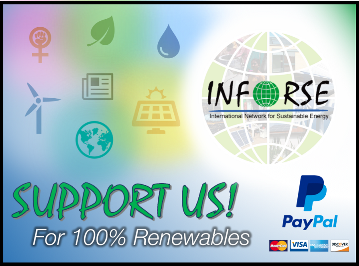|
|
|
|
|
|
|
|
|
|
|
|
|
|
|
|
|
|
|
|
|
| Follow Us: |
| How to Realise Biomass Potential in Thailand? | |
|
The cogeneration system of a rice mill decreased its electricity costs by 40,000 USD/month, increasing the income by 1.1 million USD / year by exporting ashes. Using biomass for energy could reduce the oil consumption of Thailand by 50%. Proven technology is available. However, unfair market regulations, lack of economic incentives, and unfair pricing are obstacles to realisation of these potentials. By Decharut Sukkumnoed (left) and Suphakij Nuntavorakarn (right), Sustainable Energy Network for Thailand (SENT), INFORSE Regional Coordinator |
|
| Chia Meng Rice Mill | |
|
At present, there are factories, especially sugar- and rice mills utilizing agricultural waste for energy production. The Chia Meng Rice Mill, in Nakhon Ratchasima province, is one of these factories. It uses agricultural waste to generate energy for both heat and power with just one system. (*) With its milling capacity of 600-700 tons of rice per day, the rice mill produces 140 tons of rice husks per day, of which about 115 tons are used as fuel in the cogeneration system. • The system was installed with a heat capacity of around 18 tons of steam per hour and a power capacity of 2.5 MW. • The investment amounted to 5.4 million USD. • The cogeneration system has helped this rice mill to utilize large quantities of its rice husks to decrease its cost of production, because the mill does not need to buy diesel fuel for heat production or to purchase electricity from the local utility. • Electricity expenses have dropped from about 48,600 USD per month to 8,100 USD per month. • Moreover, a byproduct of the system is the rice-husk ash, which can be exported to other countries, like Germany etc., for use in their ceramic and metal industries. • The mill’s income from exporting ash has reached 1.1 million USD a year. • The factory is now planning to expand its power plant and to sell its excess power to the grid, which will increase its benefits from its own waste. (*) The rice mill received the advice from the EC-ASEAN Cogen Program based at the Asian Institute of Technology (AIT), Thailand. The Cogen Program is an economic cooperation between the European Commission (EC) and the Association of South-East Asian Nations (ASEAN) which aims to accelerate the implementation of proven technologies in generating heat and power from wood and agro-industrial residues. Chia Meng rice mill producing electricity from rice husk. Photo: Finn Tobiesen, OVE |
|

| |
| Published in Sustainable Energy News |
|
|
Go back to main page of ISSUE #29 (684KB) 16 pages (2000-05-01) |
|
| Contact | |
| |
INFORSE Secretariat Klosterport 4F, 1. floor DK-8000 Aarhus C Denmark Phone: +45 86 22 70 00 Twitter: INFORSE_org Facebook: INFORSE Web: inforse.org E-mail: ove@inforse.org |
